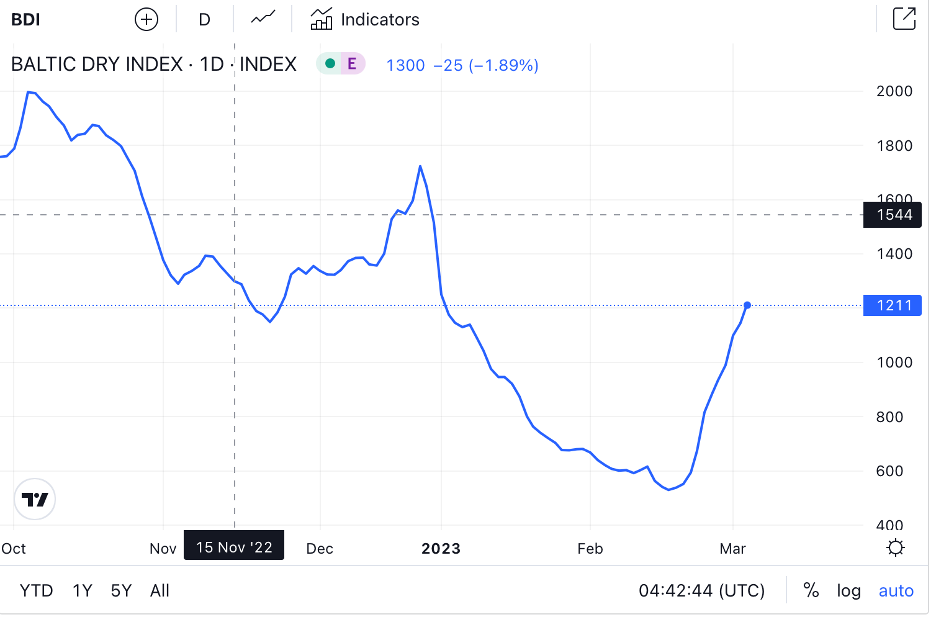July 12, 2023
What is the Baltic Dry Index?
July 12, 2023
Hello everyone,
Investors are always looking for practical economic indicators they can use to help them make informed investing decisions. The best way to do this is to look at practical indicators in the world around you – like looking at products your friends are buying or what stores always seem to be crowded. The Baltic Dry Index (BDI) is a practical economic indicator on a global scale.
The Baltic Dry Index is a measure of what it costs to ship raw materials – like iron ore, steel, cement, coal, and so on – around the world. The Baltic Dry Index is compiled daily by The Baltic Exchange. To compile the index, members of the Baltic Exchange call dry bulk shippers around the world to see what their prices are for 22 different shipping routes around the globe. Once they have obtained these numbers, they compile them and find an average. To ensure they are getting a comprehensive view of the entire shipping industry when looking at various shipping costs, the Baltic Exchange looks at costs for each of the following four sizes of ships:
Capemax – (10% of the global fleet)
Panamax (19 % of the global fleet)
Handymax, or Supramax (37% of the global fleet)
Handysize (34% of the global fleet)
Why Investors Watch the Baltic Dry Index
The BDI is a leading indicator that provides a clear view of the global demand for commodities and raw materials. The fact that the Baltic Dry Index focuses on raw materials provides a glimpse into the future. Producers buy raw materials when they want to start building more finished goods and infrastructure – like automobiles, heavy machinery, roads, buildings, and so on. Producers stop buying raw materials when they have excess inventory and when they stop infrastructure projects.
Typically, demand for commodities and raw goods increases when global economies are growing. For investors, knowing when the global economy is growing is helpful because that means stock prices, commodity prices and the value of commodity-based currencies should be increasing. Conversely, demand for commodities and raw goods decreases when global economies are stalling or contracting. For investors, knowing when the global economy is contracting is helpful because that means stock prices, commodity prices and the value of commodity-based currencies should be decreasing.
The Baltic Dry Index is also a powerful indicator because it is a simple, real-time indicator that is difficult to manipulate. Some economic indicators – like unemployment rates, inflation indexes, and oil prices – can be difficult to interpret because they can be manipulated or influenced by governments, speculators, and other key players. The Baltic Dry Index, on the other hand, is difficult to manipulate because it is driven by clear forces of supply and demand. The demand that affects the Baltic Dry Index is the demand of commodity buyers who need the raw goods for production. It is difficult to manipulate or distort demand because it is calculated solely by those who have placed orders to have raw goods shipped. Nobody is going to pay to book a Capemax cargo ship that isn’t actually going to use it.
Interpreting the Baltic Dry Index
The Baltic Dry Index typically increases in value as demand for commodities and raw goods increases and decreases in value as demand for commodities and raw goods decreases.
When the BDI starts moving up:
-Global economies are starting to, or continuing to, grow
-Companies are starting to, or continuing to, grow
-Stock prices should start to, or continue to, increase in value
-Commodity prices should start to, or continue to, increase in value
-The value of commodity currencies – like the Canadian dollar (CAD), the Australian dollar (AUD), and the New Zealand dollar (NZD) – should start to, or continue to, increase in value.
If the Baltic Dry Index is turning down, the opposite happens. Global economies and companies start to contract. Stock and commodity prices start to decrease, and the value of commodity currencies starts to decrease.
So, catching up with The Baltic Dry Index occasionally seems like a good idea to me.
Have a great week.
Cheers,
Jacque
"Never let the fear of striking out keep you from playing the game." - Babe Ruth




